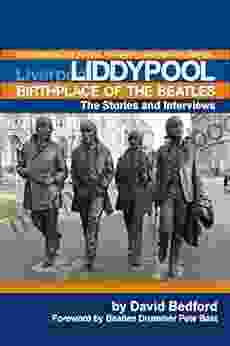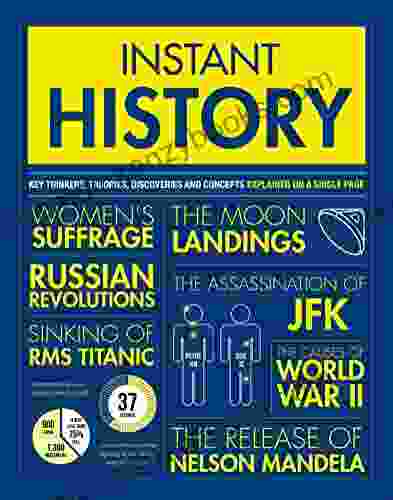Key Thinkers, Theories, Discoveries, and Concepts: Explained on a Single Page Instant

5 out of 5
| Language | : | English |
| File size | : | 5385 KB |
| Text-to-Speech | : | Enabled |
| Screen Reader | : | Supported |
| Enhanced typesetting | : | Enabled |
| Word Wise | : | Enabled |
| Print length | : | 176 pages |
| Lending | : | Enabled |
Throughout history, brilliant minds have emerged to challenge our understanding of the world and push the boundaries of human knowledge. From the ancient philosophers to modern-day scientists, these key thinkers have left an enduring legacy of ideas, theories, and discoveries that have shaped our societies and cultures.
This article presents a comprehensive exploration of some of the most influential thinkers, groundbreaking theories, and pivotal discoveries that have shaped our understanding of the world. By bringing together these diverse ideas and concepts on a single page, we aim to provide a concise and accessible overview of the intellectual landscape that has shaped our civilization.
Philosophy
- Socrates: The father of Western philosophy, Socrates believed in the pursuit of knowledge through questioning and critical thinking. His famous Socratic method involves asking a series of probing questions to uncover contradictions and expose ignorance.
- Plato: Plato's theory of Forms posits that there exists a realm of unchanging, ideal forms beyond our physical world. These forms are the true essence of things, and our experiences in the physical world are mere shadows of these ideal forms.
- Aristotle: Aristotle was a prolific philosopher and scientist who made significant contributions to logic, ethics, and metaphysics. His syllogistic logic remains a fundamental tool in philosophical reasoning, and his concept of the four causes has influenced scientific inquiry for centuries.
- Rene Descartes: Descartes' famous dictum, "I think, therefore I am," established the primacy of self-awareness in philosophy. He argued that the existence of the self is indubitable, and that all else must be examined with skepticism.
- Immanuel Kant: Kant's Critique of Pure Reason revolutionized philosophy by arguing that our knowledge of the world is shaped by our own cognitive structures. He distinguished between the phenomenal world, as we experience it, and the noumenal world, which remains beyond our understanding.
Science
- Nicolaus Copernicus: Copernicus' heliocentric model of the solar system placed the Sun, not the Earth, at the center of our planetary system. This radical idea overturned the prevailing geocentric model and laid the foundation for modern astronomy.
- Isaac Newton: Newton's laws of motion and universal gravitation revolutionized our understanding of the physical world. These laws describe the behavior of objects in motion and the force of attraction between all objects in the universe.
- Charles Darwin: Darwin's theory of evolution by natural selection explained the diversity of life on Earth. He proposed that organisms gradually change over time through the process of natural selection, where those with traits that enhance their survival and reproduction are more likely to pass on their genes.
- Albert Einstein: Einstein's theory of relativity transformed our understanding of space, time, and gravity. He proposed that space and time are not absolute but relative to the observer, and that gravity is not a force but a curvature of spacetime.
- Marie Curie: Marie Curie was a pioneering physicist and chemist who made significant contributions to the field of radioactivity. She discovered two new elements, radium and polonium, and conducted groundbreaking research on the properties of radioactive substances.
History
- Thucydides: Thucydides, known as the father of scientific history, wrote the History of the Peloponnesian War, which is widely regarded as one of the most accurate and objective historical accounts ever written.
- Edward Gibbon: Gibbon's The History of the Decline and Fall of the Roman Empire is a monumental work that examines the causes of the fall of the Roman Empire. His insights into the factors that contribute to the rise and fall of civilizations remain relevant today.
- Karl Marx: Marx's theory of historical materialism views history as a struggle between classes, with the oppressed proletariat ultimately overthrowing the capitalist bourgeoisie. His ideas have had a profound impact on social and political thought.
- Hannah Arendt: Arendt was a philosopher and political theorist who wrote extensively about totalitarianism, the nature of power, and the human condition. Her work has influenced contemporary political discourse and helped to shape our understanding of the dangers of unchecked power.
- Howard Zinn: Zinn's A People's History of the United States provides an alternative perspective on American history, focusing on the experiences of marginalized groups and challenging the traditional narrative of American exceptionalism.
Psychology
- Sigmund Freud: Freud's theory of psychoanalysis revolutionized our understanding of the human mind. He proposed that our subconscious mind contains repressed thoughts, feelings, and memories that influence our behavior and personality.
- Carl Jung: Jung's theory of analytical psychology focused on the collective unconscious, a reservoir of shared memories, symbols, and archetypes that exist in all human beings. He also developed the concept of introversion and extroversion.
- B.F. Skinner: Skinner's theory of operant conditioning demonstrated that behavior can be shaped through reinforcement and punishment. His work has had a significant impact on education, psychology, and animal training.
- Abraham Maslow: Maslow's hierarchy of needs proposes that human beings have a hierarchy of needs, from basic physiological needs to self-actualization. His theory has been widely used in psychology and motivation research.
- Elizabeth Loftus: Loftus's research on false memories has shown that human memory is malleable and can be influenced by external factors. Her work has implications for eyewitness testimony and criminal investigations.
Sociology
- Emile Durkheim: Durkheim's theory of functionalism views society as a complex system of interconnected parts that work together to maintain equilibrium. He also developed the concept of social solidarity.
- Max Weber: Weber's theory of social action emphasizes the importance of understanding the subjective meanings that individuals attach to their actions. He also developed the concept of social stratification.
- Karl Marx: Marx's theory of historical materialism, mentioned earlier in the history section, also has significant implications for sociology, providing a class-based analysis of society and its institutions.
- Talcott Parsons: Parsons' theory of social action focuses on the role of social systems in shaping individual behavior. He developed the concept of structural functionalism, which views society as a system of interrelated subsystems that work together to maintain stability.
- Michel Foucault: Foucault's work on power and discourse has influenced sociological research on the ways in which power operates in society and how it shapes our knowledge and understanding of the world.
Economics
- Adam Smith: Smith's book The Wealth of Nations is considered the foundation of modern economics. He argued that the free market, driven by self-interest, can lead to economic growth and prosperity.
- Karl Marx: Marx's theory of capitalism, described earlier in the history section, also has significant implications for economics, providing a critique of the capitalist system and its inherent contradictions.
- John Maynard Keynes: Keynes's theory of Keynesian economics emphasized the role of government intervention in stimulating economic growth during periods of recession. His ideas have influenced economic policymaking for decades.
- Milton Friedman: Friedman's theory of monetarism emphasized the importance of controlling the money supply to manage inflation and economic growth. His ideas have influenced economic policymaking in many countries.
- Amartya Sen: Sen's work on development economics has focused on the importance of human capabilities and freedoms. He has developed the Human Development Index, which measures the quality of life in different countries.
Literature
- William Shakespeare
5 out of 5
| Language | : | English |
| File size | : | 5385 KB |
| Text-to-Speech | : | Enabled |
| Screen Reader | : | Supported |
| Enhanced typesetting | : | Enabled |
| Word Wise | : | Enabled |
| Print length | : | 176 pages |
| Lending | : | Enabled |
Do you want to contribute by writing guest posts on this blog?
Please contact us and send us a resume of previous articles that you have written.
 Book
Book Novel
Novel Page
Page Chapter
Chapter Text
Text Story
Story Genre
Genre Reader
Reader Library
Library Paperback
Paperback E-book
E-book Magazine
Magazine Newspaper
Newspaper Paragraph
Paragraph Sentence
Sentence Bookmark
Bookmark Shelf
Shelf Glossary
Glossary Bibliography
Bibliography Foreword
Foreword Preface
Preface Synopsis
Synopsis Annotation
Annotation Footnote
Footnote Manuscript
Manuscript Scroll
Scroll Codex
Codex Tome
Tome Bestseller
Bestseller Classics
Classics Library card
Library card Narrative
Narrative Biography
Biography Autobiography
Autobiography Memoir
Memoir Reference
Reference Encyclopedia
Encyclopedia Amelia Donovan
Amelia Donovan John R Mabry
John R Mabry Andi Jones
Andi Jones Andrea Raimondi
Andrea Raimondi Amelia Freer
Amelia Freer Jeffrey Janakus
Jeffrey Janakus Helen Schucman
Helen Schucman Amber Locke
Amber Locke Amy Hest
Amy Hest Andrea Pennington
Andrea Pennington Terry Matlen
Terry Matlen Amber Brooks
Amber Brooks Anthony Kingston
Anthony Kingston Pete Riggs
Pete Riggs Patricia Gardner
Patricia Gardner Amy Zerner
Amy Zerner Jane Q Koenig
Jane Q Koenig Anatoly Volkhover
Anatoly Volkhover Hua Ching Ni
Hua Ching Ni Amy Harmon
Amy Harmon
Light bulbAdvertise smarter! Our strategic ad space ensures maximum exposure. Reserve your spot today!

 Johnny TurnerThe How Can It Be Gluten Free Cookbook: A Comprehensive Guide to Delicious...
Johnny TurnerThe How Can It Be Gluten Free Cookbook: A Comprehensive Guide to Delicious... Blake BellFollow ·7.9k
Blake BellFollow ·7.9k Gustavo CoxFollow ·6.6k
Gustavo CoxFollow ·6.6k Fabian MitchellFollow ·8.1k
Fabian MitchellFollow ·8.1k Austin FordFollow ·9.9k
Austin FordFollow ·9.9k Kirk HayesFollow ·8.6k
Kirk HayesFollow ·8.6k Colt SimmonsFollow ·2k
Colt SimmonsFollow ·2k Jake PowellFollow ·11.4k
Jake PowellFollow ·11.4k Jeff FosterFollow ·14.6k
Jeff FosterFollow ·14.6k

 Miguel Nelson
Miguel NelsonFour Cookbooks In One: Recipes To Fight Cancer, Heart...
Looking for a healthy way...

 Marcus Bell
Marcus BellHearts and Souls: Exploring the Lives and Legacies of...
The Special Olympics movement has been a...

 Tony Carter
Tony CarterDiagnosed With Breast Cancer: Navigating Life After the...
A breast cancer diagnosis can be a...

 Joe Simmons
Joe SimmonsLiddypool: The Stories and Interviews – A Literary...
In the realm of...

 Jett Powell
Jett PowellBreakfast for Boneheads: 66 Breakfast Recipes for Lazy...
Are you tired of eating the...
5 out of 5
| Language | : | English |
| File size | : | 5385 KB |
| Text-to-Speech | : | Enabled |
| Screen Reader | : | Supported |
| Enhanced typesetting | : | Enabled |
| Word Wise | : | Enabled |
| Print length | : | 176 pages |
| Lending | : | Enabled |











